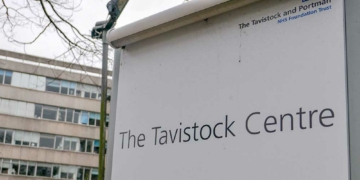Jo Bartosch reports on the first ever Detransition Awareness Day and asks Keira Bell why it is so important people hear destransitioners’ stories and experiences.
Sometimes it seems like every day is an awareness day, but today’s is important. The first of its kind; Friday 12th March marks Detransition Awareness Day. Detransitioners are often shut out of the rainbow-themed festivities that punctuate the year, and when they take the decision to return to their sexed identity they are often left with no medical or psychological support.
Keira Bell, one of the UK’s most prominent detransitioners who is currently pursuing a case against the NHS Tavistock and Portman NHS Trust, tells me:
“Detrans Awareness Day is necessary because our stories are constantly shut down and there is a lot of stigma surrounding the topic. I think the mainstream has been hoping that we’ll just quietly go away so that medical transition can continue to be seen as a really positive, solid solution for all. It’s too much for them to admit that they’ve either been promoting or have been complicit in something that has caused so much harm.”
Bell, 24, adds:
“I feel really positive about this initiative. We have come together as a team and we are giving hope to others. It’s really important to us that we are better understood for medical and mental health care reasons. It’s sad to me personally that we are even in this position. But I’m feeling optimistic that this will help to create positive change for us now and for those that come after.”

Keira Bell speaking on Channel 4
Detransition Awareness Day is a collaborative effort between Detrans Voices, Detrans Canada and Post Trans. It is difficult to estimate the numbers of detransitioners as there is little research into the community. What is clear is that the numbers are growing, with detransitioners using social media to find one another and give peer support.
“I think the mainstream has been hoping that we’ll just quietly go away so that medical transition can continue to be seen as a really positive, solid solution for all. It’s too much for them to admit that they’ve either been promoting or have been complicit in something that has caused so much harm.”
The rise in detransitioners corresponds to demographic changes. Over recent years there has been a shift in the profile of those seeking to switch sex; whereas once a handful of men sought to be recognised as women often toward middle-age, today many people begin their transition as adolescents. The ratio of male to female has also flipped; in recent years 75% of those referred to gender identity services in the UK are girls who wish to become boys.
It seems there is an informal veto on any attempts to investigate detransition. When in 2016 James Caspian, a counsellor and therapist, “became aware that there appear to be a growing number of people who have sought to reverse the surgery they had as part of a gender transition” he applied to Bath Spa University to study the phenomenon. Caspian explained on his Crowdfunder page why he wanted to research this group:
“Gender Reassignment Surgery includes surgery to the genitals, and for women changing to male, often removal of the breasts. I wanted to talk to the people who regretted their GRS and then had surgery to try to reverse the original surgery. There is no research into this phenomenon, and it is needed to develop insight into why this is happening and to learn from these peoples’ experiences.”
Bath Spa University initially granted permission for his Masters research and then blocked it over fears “it might attract unpleasant comments on social media, which they said might be detrimental to the reputation of the university.”
The online community of detransistioners use the salamander as their emblem, a lizard which can grow back lost body parts. Whilst there is little that can be done to restore the harm caused to the bodies of young detransitioners, greater awareness of their situation might prevent others from unnecessary surgeries and harmful hormone treatments.
The online community of detransistioners use the salamander as their emblem, a lizard which can grow back lost body parts. Whilst there is little that can be done to restore the harm caused to the bodies of young detransitioners, greater awareness of their situation might prevent others from unnecessary surgeries and harmful hormone treatments.
Having gone through immense personal suffering, detransitioners are a powerful and determined group who have been failed by the institutions charged with their protection. Universities, health professionals and mainstream LGBT organisations cannot force detransitioners into a closet; their numbers are growing and their stories will be heard.
























I never want sound like I'm telling people what to do with their bodies. Plastic surgery is going to happen, and opposing it is folly. Where I draw the line is children agreeing to have radical procedures that they are too young to understand the ramifications of. Society is supposed to protect children from harm. I am also firmly opposed to "gender transition" procedures resulting in sterilization. There's an ugly history of that type of surgery being targeted at lower-class, low-income and nonwhite people, and guess what? A lot of gender dysphoria patients fall into those categories. Call sterilization by another name and it's still genocidal. My last objection to radical "gender reassignment" is religious: I don't believe God places people in the "wrong body".
Thank you for spreading the word! ^_^
It is hard to understand why de-transition is not widely researched especially by Health providers. In all other areas of medicine follow up of patients is so important. Is there something to hide.
As usual kiera leads the way. This is vital stuff.
It's significantly important for a 'Detransition Awareness Day' due to the sheer numbers of detransitioners now out there, often ignored, berated, and isolated. A great thought provoking article!
Well done and thank you to Keira and Co. for raising awareness of detransitioners and standing strong in the face of immense pressure.